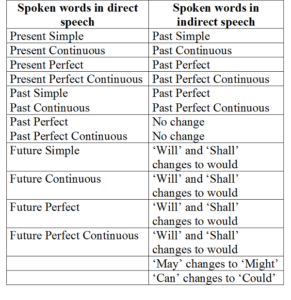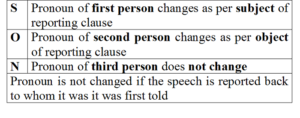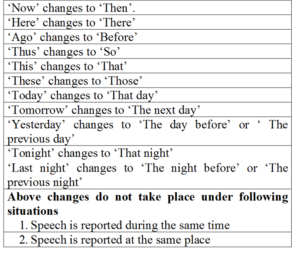Rules of Direct Indirect
Direct Speech
Sohan said, “It is raining.”
Exact words used by speaker are expressed.
Exact words used by speaker are put in inverted commas.
The word ‘said’ is called reporting verb.
‘Sohan said’ is called reporting clause or reporting speech.
‘It is raining’ is called spoken words or spoken part.
The first word of spoken words begins with a capital letter.
Indirect Speech
Sohan said that it was raining.
Someone (called a reporter) is reporting ( to a listener) what was narrated by another speaker.
Sometimes the original speaker narrates what he / she spoke earlier. In this case the original speaker is also the reporter.
Spoken speech is not put in inverted commas.
A conjunction ‘that’ is put between reporting clause and spoken words. We shall study about use of other conjunctions a little later.
The tense of the spoken words is changed. We shall understand this in detail.
Rules for changing Direct Speech into Indirect Speech
1. If reporting clause is in present or future tense then tense of the spoken words is not changed.
Sohan says, “He is going to Jaipur.”
Sohan says that he is going to Jaipur.
Sohan says, “He will go to Jaipur.”
Sohan says that he will go to Jaipur.
Sohan says, “He was going to Jaipur.”
Sohan says that he was going to Jaipur.
Sohan will say, “He is going to Jaipur.”
Sohan will say that he is going to Jaipur.
Sohan will say, “He was going to Jaipur.”
Sohan will say that he was going to Jaipur.
2. If reporting clause is in past tense then tense of spoken words is changed as per following table –


Sohan said, “He goes to Jaipur.”
Sohan said that he went to Jaipur.
Sohan said, “He is going to Jaipur.”
Sohan said that he was going to Jaipur.
Sohan said, “He has gone to Jaipur.”
Sohan said that he had gone to Jaipur.
Sohan said, “He has been going to Jaipur.”
Sohan said that he had been going to Jaipur.
Sohan said, “He went to Jaipur.”
Sohan said that he had gone to Jaipur.
Sohan said, “He was going to Jaipur.”
Sohan said that he had been going to Jaipur.
Sohan said, “He had gone to Jaipur.”
Sohan said that he had gone to Jaipur.
Sohan said, “He had been going to Jaipur.”
Sohan said that he had been going to Jaipur.
Sohan said, “He will go to Jaipur.”
Sohan said that would go to Jaipur.
Sohan said, “He will be going to Jaipur.”
Sohan said that he would be going to Jaipur.
Sohan said, “He will have gone to Jaipur.”
Sohan said that he would have gone to Jaipur.
Sohan said, “He will have been going to Jaipur.”
Sohan said that he would have been going to Jaipur.
Sohan said, “He may go to Jaipur.”
Sohan said that he might go to Jaipur.
Sohan said, “He can go to Jaipur.”
Sohan said that he could go to Jaipur.
3. If spoken words indicate a universal fact or a habitual action, tense of spoken words is not changed.
Sohan said, “The Sun rises in east.”
Sohan said that the Sun rises in east
Sohan said, “Honesty is the best policy.”
Sohan said that honesty is the best policy.
Sohan said, “I always get up at 5 in the morning.”
Sohan said that he always gets up at 5 in the morning.
4. Pronouns in the spoken words are changed as per following table –


These are changed so that their relationship with the reporter and listener is correctly indicated.
Sohan said to me, “I am travelling.”
Sohan told me that he was travelling.
Sohan said to me, “You are right.”
Sohan told me that I was right.
Sohan said to me, “He is sick.”
Sohan told me that he was sick.
Sohan said to you, “You are the manager.”
Sohan told you that you were the manager.
5. Change in words of time and place


Sohan said to me, “He is sick now.”
Sohan told me that he was sick then.
Sohan said to me, “Books are here.”
Sohan told me that books were there.
Sohan said to me, “He came two days ago.”
Sohan told me that he had come two days before.
Sohan said to me, “I will take this book.”
Sohan told me that he would take that book.
Sohan said to me, “You will not cross these obstacles.”
Sohan told me that I would not cross those obstacles.
Sohan said to me, “He may come tomorrow.”
Sohan told me that he might come next day.
Sohan said to me, “He came yesterday.”
Sohan told me that he had come the day before.
Sohan says , “I am happy to be here.”
Sohan syas that he is happy to be here.
(Reporting at the same place)
When spoken words is interrogative
1. The verb of the reporting clause is changed to ‘asked’, ‘enquired’ , ‘questioned’, ‘wanted to know’ etc.
2. The question asked in the spoken words can have two types of answers –
(a) If the answer to the question can be in either ‘yes’ or ‘no’, the conjunction used between reporting clause and spoken words is ‘if’
(b) If the answer to the question is a detailed explanation, the conjunction used between reporting clause and spoken words is an interrogative word like ‘who’, ‘which’, ‘when’ etc. It is the same word that has been used in the direct speech at the beginning of spoken words.
Sohan said to me , “Are you travelling today?”
Sohan asked me if I was travelling that day.
Sohan said to me , “Where are you travelling today?”
Sohan asked me where I was travelling that day.
Sohan said to me , “Where is Peter?”
Sohan asked me where was Peter.
Sohan said to me , “Have you completed your home-work?”
Sohan asked me if I had completed my home-work.
When spoken words is a command or a request
1. The verb of the reporting clause is changed to ‘commanded’, ‘ordered’ , ‘requested’, ‘shouted’, ‘urged’, ‘pleaded’, ‘advised’ etc.
2. The imperative mood of the spoken words is changed to infinitive mood.
I said to Peter, “Please give me your book.”
I requested Peter to give me his book.
Sohan said to Peter, “Please give me your book.”
Sohan requested Peter to give him his book.
Teacher said to students, “Leave the class.”
Teacher ordered students to leave the class.
Father said to his son, “Work hard.”
Father advised his son to work hard.
When spoken words is an exclamation or a wish
1. The verb of the reporting clause is changed to ‘wished’, ‘exclaimed’, ‘blessed’, regretted etc.
2. The exclamatory mood of the spoken words is changed to infinitive mood.
3. The words showing mood of exclamation like ‘alas’, ‘oh’ etc. are omitted.
Sohan said, “Alas! I am sick.”
Sohan regretted that he was sick.
Sohan said to me , “May you be happy.”
Sohan wished that I might me happy.
Sohan said to me, “Hurray! I have come first.”
Sohan exclaimed to me that he had come first.
****

0 Comments